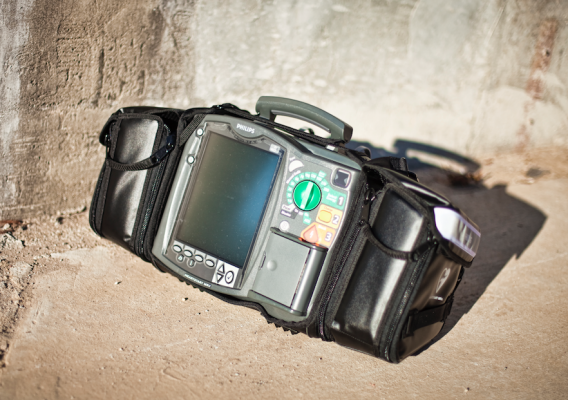
February 12, 2018 — Philips is recalling the HeartStart MRx Defibrillator due to a defect in the device's Gas Discharge Tube (GDT) that may prevent the device from working automated external defibrillator (AED) mode, or produce noisy ECGs in manual mode. The U.S. Food and Drug Administration (FDA) last week announced it identified this as a Class I recall, the most serious type of recall. The FDA said use of these devices may cause serious injuries or death.
Philips said the GDT has micro cracks, which allow internal gasses to escape and causes the tubes to not function as expected. This also permits an electrical current surge to cross the device's designated resistors, which will damage the resistors and prevent the device from working while in automated external defibrillator (AED) mode.
As a result of this GDT defect, the HeartStart MRx may fail at any time, including when delivering repeated shocks in AED mode, or during the periodic Operational Check outlined in the device's Instructions for Use. If the device is used in AED mode after failure, the device will not deliver patient therapy. Continued use of the device in AED mode after failure may lead to serious patient injury or death.
However, the FDA said the HeartStart MRx will continue to work in manual mode after AED mode failure, though the electrocardiogram (ECG) displayed on the device will be noisy, which may make provider interpretation difficult.
On June 13, 2017, Philips issued a Medical Device Correction Notification letter informing customers of the device's risks.The letter directed customers to:
• Check all inventory for affected models of the HeartStart MRx Defibrillator.
• Contact Philips if the HeartStart MRx Defibrillator fails to function as intended. If the device fails to function, users:
• Should switch the device to manual mode (if previously operating in AED mode).
• May still use the ECG display and waveforms from other monitoring leads to identify a shockable rhythm and deliver shock therapy while in manual mode.
• May notice the device indicates poor pad placement even though the pads are appropriately positioned.
• Will be contacted by Philips to repair the affected device(s) once replacement parts are available.
Customers who have questions or need additional information or support regarding this recall should contact their local Philips representative.
The recall is for model numbers M3535A, M3536A. The manufacturing dates are between Sept. 22, 2016 to Oct. 31, 2016, and they were distributed between Sept. 26 to Nov. 2, 2016. The recall includes 71 devices in the United States.
For more information from the FDA.


 January 13, 2026
January 13, 2026 









